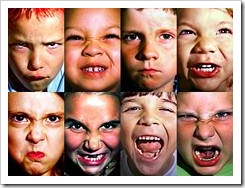 Last week, I wrote about the comparison between a food diet and a TV diet. One thing I find particularly important is Junk TV and this is also what I emphasize most to my own kids. Basically, if most of your food is healthy, eating junk from time to time will not kill you. Similarly, if most of your kids’ TV time is educational and positive, you can allow them to watch some junk TV occasionally.
Last week, I wrote about the comparison between a food diet and a TV diet. One thing I find particularly important is Junk TV and this is also what I emphasize most to my own kids. Basically, if most of your food is healthy, eating junk from time to time will not kill you. Similarly, if most of your kids’ TV time is educational and positive, you can allow them to watch some junk TV occasionally.
If you want to make sure your kids do not consume junk TV, you need to define what junk is. Unfortunately, just like you can find some research saying coffee is unhealthy and other studies claiming it can cure Alzheimer’s, you will also find people saying that watching TV is learning about real life and others saying it is anything but real life.
As with any matter of choice, you have to find your own definition. To discover if a show on TV is junk or not, you need to go through two steps:
- If you think a show is junk – easy! No need to debate this, but very important to remember why you categorize it as junk, so you can use the explanation to help your kids understand your approach.
- If you do not think a show is junk, watch your kids’ reaction to it. Some shows are neither good nor bad, but the kids’ reaction to them may be the reason you should consider them unhealthy. For example, say your kids watch Superman and think they can fly from the window, this show is a bad influence on them, regardless of how many good messages there are in it. Observe your kids’ mood and behavior after watching various shows and listen to how they replay and recite parts of those shows later on.
Kids are not the same
 To come up with a good watching plan for your kids, you must find out what can be included and what cannot. This can be challenging when you have kids at different ages and with different personalities, because it means their TV plans should be different too. Yet, it is important to remember that kids are not the same – some can watch shows and take good things out of them and others take fear or a negative attitude from the same shows. When Eden was 8 or 9, she could watch PG movies with scary villains, while Tsoof was so scared of such movies he could not sleep at night even when he was a bit older.
To come up with a good watching plan for your kids, you must find out what can be included and what cannot. This can be challenging when you have kids at different ages and with different personalities, because it means their TV plans should be different too. Yet, it is important to remember that kids are not the same – some can watch shows and take good things out of them and others take fear or a negative attitude from the same shows. When Eden was 8 or 9, she could watch PG movies with scary villains, while Tsoof was so scared of such movies he could not sleep at night even when he was a bit older.
Asking the right questions
To help you find out if a particular show is healthy or unhealthy for your kids, you can ask yourself some questions. I am sure no TV show will get positive answers on all the questions, but these questions will allow you to weigh the effect of each show on your kids’ attitude and behavior.
In the previous posts, I talked about the dangers of watching too much TV. Ask yourself the following questions regarding each of the influences. If the sum of them comes out more positive than negative, this particular show will do more good than bad – allow it into the watching plan. If the sum of the answers comes out more negative – it is better to keep it out of the plan.
- How does this program influence my kids’ health?
- How does this program influence my kids’ behavior?
- How does this program influence my kids’ outlook on life?
- How does this program influence my kids’ relationships?
- How does this program influence my kids’ education?
This analysis of your kids’ watching habits cannot be copied from one family to another. For each parent, the importance of each category is different. Some may think that kids’ health is the most important factor when making the watching plan while others may think their kids’ education is more important. To understand yourself better, try rating the influences in order of importance to you.
- Health
- Behavior
- Outlook on life
- Relationship
- Education
Here is a list of questions in each category that you can ask yourself to help you determine the positive or negative influence of each program/show on your kids.
Health questions
 Are my kids at any health risk from spending this time in front of the TV?
Are my kids at any health risk from spending this time in front of the TV?- How does this show affect my kids’ eating habits (for example, a special show during dinner time)?
- Are my kids receiving positive health messages from this show?
- How does watching this show affect my kids’ sleeping habits?
- Does watching a show create a positive or a negative emotional reaction (laughter, smiles or giggles vs. sadness, worries or fears)?
- Do the ads on this show promote health or not (vegetables vs. junk food, exercise vs. medicine)?
Behavior questions
- How does this show influence my kids’ mood?
- How does this show affect my kids’ language?
- What kind of role models are my kids exposed to when they watch this show?
- What does this show motivate my kids to do?
- What tones of voice are being modeled in this program?
- Will watching this show promote good relationships between my kids?
- Does watching TV interfere with my kids’ ability to keep themselves busy?
- Do my kids display addictive behavior when they watch this show (do they plan their life around it and idolize the characters or the actors)?
- Do the ads on this show promote good behavior or not? Many ads use humor, but kids do not understand the double or hidden meanings. For example, there was a commercial I loved about two women cheating, stealing from each other and fighting over a chocolate pudding at the supermarket. Although it seemed funny to me, it may have promoted cheating, stealing and fighting as acceptable behaviors to kids.
Outlook on life questions
 What kind of morals and values does this show portray?
What kind of morals and values does this show portray?- What kind of priorities does this show focus on (my boyfriend has left me, so it is the end of life vs. people being considerate to one another)?
- Does this program deliver stereotypical gender messages to my kids (all men are… all women are…)?
- Does this program deliver stereotypical racial messages to my kids (all Arabs are… all gay people are…)?
- How are families presented in this program (constant fighting and bickering vs. support and love)?
- Do the ads on this show promote a positive and healthy outlook on life? If you take the previous commercial (that I really liked), it could create a somewhat disturbing view – “I should watch out for people who might come and take things from me any way they can (I see them every day on TV)”.
Relationship questions
- Does this show promote good social relationships or does it encourage loners?
- Does this program convey stereotypical gender messages to my kids (all men are… all women are…)?
- Does this program convey stereotypical racial messages to my kids (all Arabs are… All gay people are…)?
- Do different people mix well on this show or are they segregated?
- How are family relationships presented in this program (constant fighting and bickering vs. support and love)?
- Does this show expose my kids to appropriate relationship models (premature sex, war, violence, lack of communication, cynicism)?
- Do the ads on this show promote good relationships? If we use the previous example then the message is “Getting the chocolate pudding is more important than having a good relationship”.
- Can we watch this show together (and maybe talk about it later) to improve our family’s quality time?
Education questions
- What can my kids learn from this show?
- Do my kids learn the “right” things from this show? Ask them. You will be surprised!
- Is the information in this show appropriate for my kids’ age?
- Does this show contribute to my kids’ motivation and interest?
- Do the ads on the show promote education (are the commercials for a new course teaching a hobby, a new book that is coming out or to encourage more consumption)?
- Can we talk about this show afterwards to make sure kids take all the good learning from it?
- Does this show offer good solutions or only presents problems?
Use these questions to help you decide if a program has a positive influence on your kids or not.
Join me next week for the 13th chapter of TV Diet – Raising Aware Kids.
Happy parenting,
Ronit
This post is part of the series TV Diet:
- TV Diet (1): Too Much TV?
- TV Diet (2): Health Concerns
- TV Diet (3): Kids Behaving Badly
- TV Diet (4): Kids’ Outlook on Life
- TV Diet (5): Parent-Child Relationships
- TV Diet (6): Disposable relationships
- TV Diet (7): Learning and Education
- TV Diet (8): How Much TV is Too Much?
- TV Diet (9): Kids’ Personalities
- TV Diet (10): Parents’ Influence
- TV Diet (11): The Right TV diet
- TV Diet (12): Junk TV
- TV Diet (13): Raising Aware Kids
- TV Diet (14): Cutting Junk TV
- TV Diet (15): Routine
- TV Diet (16): Healthy Alternatives
- TV Diet (17): More Healthy Alternatives
- TV Diet (18): Conclusion
 Are my kids at any health risk from spending this time in front of the TV?
Are my kids at any health risk from spending this time in front of the TV? What kind of morals and values does this show portray?
What kind of morals and values does this show portray?










